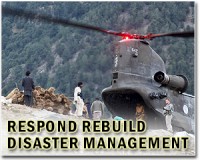| . |  |
. |
Jacksonville FL (SPX) Feb 15, 2010 Online social networking sites could solve many problems plaguing information dissemination and communications when disaster strikes, according to a report from US researchers in a recent issue of the International Journal of Emergency Management. In the wake of natural, disasters such as the Haiti earthquake, major events, such as the Hudson plane crash, and terrorist activity, online services, have become increasingly prominent as useful tools to get the news out faster than traditional media, to provide timely information sources, and even to re-connect people affected directly or indirectly as events unfold. But, are social networking tools, such as Facebook, MySpace, Twitter, and ad hoc sites set up in the wake of a major event really useful tools or are they simply riding a publicity wave? According to Connie White, of the Institute for Emergency Preparedness at Jacksonville State University in Alabama and colleagues there and at the New Jersey Institute of Technology, Newark, online social networks permit the establishment of global relationships that are domain related or can be based on some need shared by the participants. They have investigated whether or not the social network paradigm can be used to enable individuals and organizations to collaborate in mutually beneficial ways, in all stages of emergency management: mitigation, preparedness, response and recovery. There are already dozens of groups on two of the most popular social networking sites, Facebook and LinkedIn, that are allowing individuals involved in various aspects of emergency awareness and preparedness to connect, discuss, and share knowledge in specific fields. For instance, an emergency online network would need to be able to share documents and digital resources, allow members to communicate efficiently, provide a way to find specific experts in the field and beyond, share photos and video for status reports and locating missing persons, as well as allow the news media to be kept informed. Concerns such as the threat of technology failure, hackers, stalkers, viruses, flaming, and usability issues will have to be addressed in the development of emergency online networks. However, current concerns about the credibility of resources, seem already to have been addressed as witnessed by the high level of accuracy of mass collaboration during crises over the last year or two. The team points out that current social networks have limitations in terms of the collaborative tools available to users that might be repurposed for emergency use, especially given as they were generally designed with socializing rather than emergency efforts in mind. Nevertheless, within a short time, even the most cutting edge system will seem primitive as user requirements mature in all areas. Systems will ultimately emerge that allow true collaboration and have complete user control. The team suggests that in developing the use of online social networks, it is essential to engage emergency management personnel and their organizations in dialog to determine their needs, and how to best serve them.
Share This Article With Planet Earth
Related Links Institute for Emergency Preparedness Bringing Order To A World Of Disasters A world of storm and tempest When the Earth Quakes
 Ten months on, Italian quake capital remains an 'empty city'
Ten months on, Italian quake capital remains an 'empty city'L'Aquila, Italy (AFP) Feb 15, 2010 Piles of rubble still lie in the streets of L'Aquila 10 months after an earthquake struck the central Italian city, as many of its thousands of displaced residents wonder if they will ever be able to return home. Scaffolding and steel supports shore up treasured architecture in the centre of the medieval walled city, which experts predict will remain a "red zone" for the next 10 years. " ... read more |
|
| The content herein, unless otherwise known to be public domain, are Copyright 1995-2010 - SpaceDaily. AFP and UPI Wire Stories are copyright Agence France-Presse and United Press International. ESA Portal Reports are copyright European Space Agency. All NASA sourced material is public domain. Additional copyrights may apply in whole or part to other bona fide parties. Advertising does not imply endorsement,agreement or approval of any opinions, statements or information provided by SpaceDaily on any Web page published or hosted by SpaceDaily. Privacy Statement |